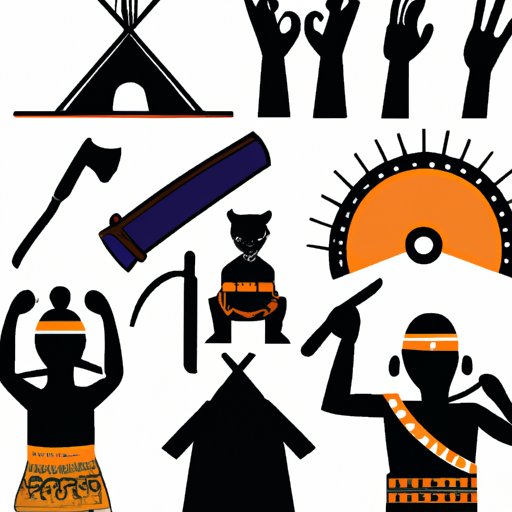Introduction
Clan culture is an integral part of many societies around the world. It involves a shared set of values, beliefs, and traditions that are passed down from generation to generation. These beliefs shape the way people interact with each other and view their place in the world. In this article, we will explore the history and traditions of clan culture, how it impacts local communities, and its influence on global politics and religion.
Analyzing the History and Traditions of Clan Culture
Clans have existed since ancient times, with some tracing their roots back to prehistoric times. The term “clan” was first used in the 16th century to refer to extended families or tribes. Clans typically share a common ancestor and are identified by a unique name or symbol. Members of a clan may be related by blood or marriage, or they may simply consider themselves to be part of a larger family.
Clan-based identity is often linked to honor and respect. Clan members take pride in their heritage and strive to uphold the values of their ancestors. This sense of belonging and shared identity is particularly strong in rural areas, where clans are often closely knit and have a long history of interdependence.
Traditions associated with clan culture vary depending on the region and the particular group. Some common traditions include rituals for honoring ancestors, feasts to celebrate special occasions, and ceremonies for important life milestones. Clan members also typically practice certain customs to maintain solidarity, such as wearing specific clothing or using a distinct dialect.

Exploring the Role of Clan Culture in Local Communities
Clan culture has a significant impact on local communities. Clan-based social structures provide a framework for how people interact with one another and establish relationships. Clan relationships can be based on kinship, marriage, or mutual trust, and they often involve a variety of obligations and expectations. Social norms are also shaped by clan culture, which can dictate the roles of men and women, acceptable behaviors, and views on authority.
The role of clan culture in conflict resolution is also noteworthy. Clans often act as mediators or arbitrators in disputes, providing a neutral platform for resolving disagreements. Clan leaders are often respected figures in the community, and they can use their influence to bring opposing sides to the table and reach a compromise.
Examining the Different Types of Clans Across Cultures
Clans are found in many different cultures around the world. African clans are typically large and organized around a single lineage. Asian clans tend to be smaller and more loosely connected. European clans are usually divided into smaller branches, while Middle Eastern clans are usually based on tribal affiliations.
Investigating the Impact of Clan Culture on Global Politics
Clan culture has had a significant influence on global politics. Clan leaders are often powerful figures who wield considerable political influence. Clan ties can also shape international relations, as countries may use them as a means of establishing diplomatic relations or forming alliances.

Understanding the Significance of Clan Relationships
Clan relationships are important for a variety of reasons. They can provide a sense of belonging, a source of financial support, and a network of trusted individuals. Clans also serve as a safety net in times of need, offering assistance and guidance when needed.

Investigating the Relationship Between Clan Culture and Religion
Clan culture and religion are often intertwined. Many clans incorporate religious beliefs and practices into their daily lives. Religion can also be used to symbolically represent clans, with symbols, colors, and stories being used to convey the history and values of the group.

Examining How Technology Has Shaped Clan Culture
Technology has had a profound impact on clan culture. Social media and online communication have made it easier for clans to stay connected and share information. New forms of clan-based organizations have emerged, allowing people to create virtual clans to connect with like-minded individuals.
Conclusion
Clan culture is an important part of many societies around the world. Its origins date back centuries, and its traditions and beliefs remain largely unchanged. Clan culture has had a significant impact on local communities, international relations, and religious practices. It has also been shaped by technology, allowing clans to form new networks and strengthen existing relationships.
(Note: Is this article not meeting your expectations? Do you have knowledge or insights to share? Unlock new opportunities and expand your reach by joining our authors team. Click Registration to join us and share your expertise with our readers.)
